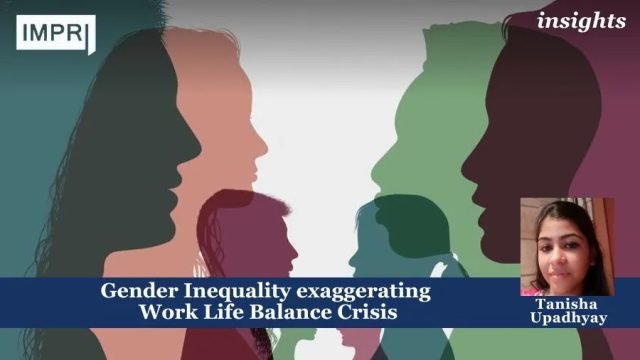Tanisha Upadhyay
Introduction
In today’s world, the concept “work-life balance” is considered to be one of the major issues that play a vital role in organizational success. As the death of a young chartered accountant (CA) from Kerala, reportedly due to ‘overwork’ sparked a nationwide debate on work-life balance, mental health, and corporate accountability. Where work life balance is itself a concern, gender inequality worsen mental health of women.
However, work-life balance is seen differently in different society. Study shows that the reasons for which female employees are facing trouble to maintain a work-life balance are mostly because of: long working hours, job rigidity, work overload, responsibilities related to child care, discrimination and biasness at work place , lack of supervisory support, dominant managerial style and scarce family support.
Impact
In India women have been participating and contributing remarkably in our economy. Despite of it, working women experience various obstacles in their personal as well as professional life. Women are struggling to balance between work-life which ultimately hampering their social life. While trying to balance work-life, women feel the pressure not only from their work place but also from their family. Since women need to play different roles in society, it is particularly
harder for women to keep balance between work-life.
Indian Institute of Management Ahmedabad (IIMA) recently released a report revealing that 67% of women in the workforce struggle to maintain a healthy balance between their professional and personal lives. The report provides critical insights into the pressures women face in the modern workplace and has highlighted the urgent need for organisations to reassess their approach to employee well-being.
Key Findings from the IIMA Report
The IIMA study, which surveyed over 2,000 working women across various sectors, found that a significant number of women are facing immense difficulty in juggling their careers with family and personal responsibilities. According to the report, more than two-thirds of respondents admitted that they constantly feel torn between their professional duties and their roles at home, leading to heightened stress, burnout, and in some cases, severe health repercussions.
The findings also highlighted the role of organisational culture and the absence of support systems in exacerbating the problem. For many women, long working hours, coupled with rigid expectations from employers, leave little room for personal time, leading to feelings of isolation and frustration. This imbalance is especially prevalent among younger women, who are more likely to be entering the workforce during formative years of family-building. Here is a look at the major findings
- 67% of women report struggling with work-life balance.
- 53% of respondents indicated they feel an overwhelming sense of guilt about not
spending enough time with family. - 48% cited workplace culture as a major contributor to stress and imbalance.
- 60% of working mothers said they face pressure from both home and work, leading to
mental fatigue. - Only 22% of organisations offer flexible work hours or remote work options to help
alleviate these pressures
Aspects of women mental health with gender inequality
- Social Support And Its Relationship With Mental Health
Social support has long been considered to be having an impact on mental health of women. Interventions to increase emotional and social support to women victims of violence might reduce the negative consequences of mental and physical health. Violence against women is like an endemic in society. It is estimated that 14–20% of women will experience rape at some point in their lives and 8–24% will be stalked by someone known or unknown to them. - Symbolic Interaction Theory
Violence in any form may entail harmful consequences. There is evidence of the long-term and deleterious effects of experiencing childhood violence in early years. The association that has emerged has indicated that witnessing childhood violence leads to poor mental health during woman’s adult years. Childhood violence also has long-term psychological effects on women. Those women who had witnessed violence were found to be having depression and poor self esteem. Further, women who experienced physical or sexual abuse in childhood also experienced ill-health with regard to physical functioning and psychological well-being as compared to other women. - Marital Responsibilities
It appears that mothers’ job has both beneficial and negative effects on their children’s development. The child suffers greatly during the baby phase as a result of the mother’s work. In that circumstances, moms should use greater caution. They ought to be aware of the fact that they spend a lot of quality time with their children. The quality of time is more essential than the quantity of time. When they get home from work, their first goal should be to relaxant to spend time with children, either sitting with them or playing with them. - Poverty And Poor Mental Health
There seems to be a vicious cycle of adversities in the case of women. Women who were poor and those who were less educated were also found to be at increased risk of poor mental health. Women living in poverty are disproportionately affected by social exploitation. These women are faced with various types of social, physical, and economic hardships, which in association with the experience of domestic violence are likely to increase their vulnerability to mental morbidities. Women in better jobs than their husbands were also found to be at risk of poor mental health, a feature that is not unique to India. Counts et al. found that where women have a higher economic status they are seen as having sufficient power to change traditional gender roles, and it is at this point that violence is at its highest. An interesting finding was that higher levels of education of both the woman and her husband acted as a protective buffer against poor mental health, suggesting the important part education could play in reducing violence against women and, thereby, mental disorder. Studies have indeed shown that low academic achievement was one of the risk factors predicting physical abuse of partners by men. Domestic violence is a complex problem and there is no single strategy that will combat all the situations.
Suggestion To Corporate Sector To Enforce Work Life Balance
- Supportive corporate culture: A corporate culture that prioritizes work-life balance fosters a positive work environment. This includes promoting a culture of respect, inclusion, and empathy, where employees feel comfortable taking time off and prioritizing their personal lives without fear of judgment or negative repercussions.
- Career development opportunities: Offering opportunities for professional growth, such as training programs, workshops, and mentorship, helps employees advance in their careers without compromising their work-life balance.
- Transparent communication: Open and honest communication between management and employees is essential. Companies that maintain transparency about policies, expectations, and changes create a trustworthy environment. This transparency helps employees feel secure and supported.
- Diversity and inclusion initiatives: Promoting diversity and inclusion ensures that all employees, regardless of their background, feel valued and respected. Inclusive policies and practices contribute to a supportive work environment where everyone can thrive.
- Employee autonomy: Granting employees autonomy and control over their work allows them to manage their tasks more efficiently. This trust in employees’ abilities to complete their work fosters a sense of responsibility and ownership, leading to a better balance between work and life.
- Leadership support: Strong leadership that advocates for work-life balance sets the tone for the entire organization. Leaders who model balanced behaviors and encourage their teams to prioritize well-being create a culture that values and supports work-life harmony.
References
- Asian News International. (2024, September 21). “She Used To Cry On Phone”: Father Of EY Employee Who Died Of ‘Overwork’
www.ndtv.com. https://www.ndtv.com/india-news/anna-sebastin-perayil-ey-employee-death-overwork-she-used-to-cry-on-phone-father-of-ey-employee-who-died-of-overwork-6617852 - Sharma, S. (2024, September 23). 67% of Women Struggle with Work-Life Imbalance, Reveals IIMA Study Amid Tragic Death of Young EY Employee: How Companies Need to Support Their Female Workforce. The Times of India. https://timesofindia.indiatimes.com/education/news/67-of-women-struggle-with-work-life-imbalance-reveals-iima-study-amid-tragic-death-of-young-ey-employee-how-companies-need-to-support-their-female-workforce/articleshow/113600043.cms
- Srivastava, K. (2012). Women and mental health: Psychosocial perspective. Industrial Psychiatry Journal, 21(1), 1. https://doi.org/10.4103/0972-6748.110938
- Tasnim, M., Hossain, M. Z., & Enam, F. (2017). Work-Life Balance: Reality check for the working women of Bangladesh. Journal of Human Resource and Sustainability Studies, 05(01), 75–86. https://doi.org/10.4236/jhrss.2017.51008
- Work-life balance: Why are Indian women feeling work stress more than men? (2024, July 20). Business Standard. Retrieved February 25, 2025, from https://www.business standard.com/india-news/work-life-balance-why-are-indian-women-feeling-work stress-more-than-men-124072000188_1.html
About the Contributor: Ms. Tanisha Upadhyay is a researcher affiliated with the Impact and Policy Research Institute, specializing in gender studies and mental health. With extensive experience in policy analysis and research, Tanisha Upadhyay played a key role in the development and analysis of the Gender and Mental Health – Cohort 3.0 project. Her contributions focused on providing in-depth research, data analysis, and policy recommendations aimed at addressing the intersection of gender and mental health issues. Her work in this cohort has provided critical insights that contribute to the ongoing discourse on mental health policies and gender equality.
Disclaimer: All views expressed in the article belong solely to the author and not necessarily to the organisation.
Read more at IMPRI:
Trump’s Strategic extortion? The cost of Ukraine’s survival and military aid
Germany at a Crossroads: The Rise of AfD and the Future of European Politics
Acknowledgment: This article was posted by Bhaktiba Jadeja, visiting researcher and assistant editor at IMPRI.



















